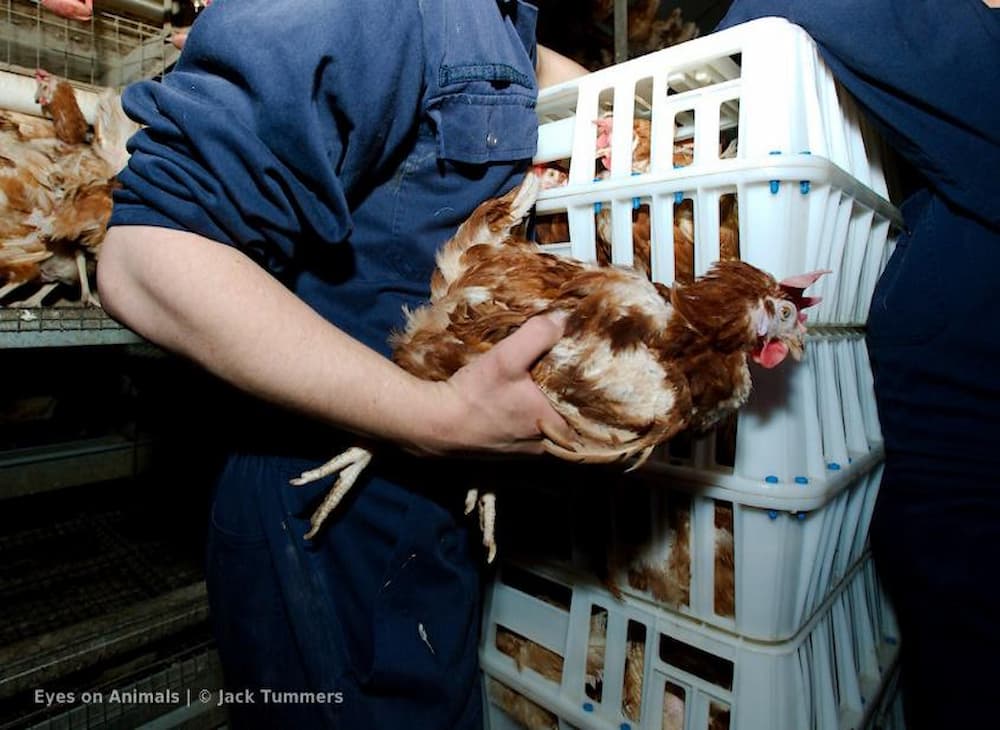Conservative Animal Welfare Media Release:
CONSERVATIVE ANIMAL WELFARE FOUNDATION WELCOMES AMENDMENT TO PROTECT END OF LAY HENS BEFORE SLAUGHTER
LONDON, 20th January 2022
Today the Conservative Animal Welfare Foundation has welcomed an amendment laid by Patron Henry Smith MP to the Animal Welfare (Kept Animals) Bill on the handling and transport of laying hens prior to slaughter.
The amendment would protect end of lay hens from rough handling while loading for transport and ensure better welfare conditions during travel. Specifically, it would legislate for:
- The prohibition of catching, lifting, or carrying a hen by one or both legs, or more than one hen at a time in each hand.
- Ensuring hens have enough room to stand upright without difficulty during transport. Their head, wings, and legs must also not be trapped in or between transport devices.
- Penalties for acting in violation of these regulations.
Co-signatories to the amendment include Conservative Animal Welfare Patrons Sir Roger Gale MP, Chris Loder MP and Giles Watling MP.
Henry Smith MP, Patron of the Conservative Animal Welfare Foundation, commented: “The UK is introducing world-leading animal welfare measures for livestock and protections for wildlife through the Action Plan for Animal Welfare. However, it is important that the 39 million laying hens in the UK are not overlooked in these efforts to raise standards.
“At the end of their lives laying hens are often subject to significant distress and injuries due to the speed of handling, and the design of transport modules used for travel to the slaughterhouse. I hope this amendment will provide better welfare conditions for laying hens at the end of their lives.”
Lorraine Platt, Co-founder of the Conservative Animal Welfare Foundation, said:
“Laying hens often suffer severe bruising, bone fractures and dislocations as they are handled and loaded onto transport, and further during the journey to the slaughterhouse where legs and wings can be trapped between crates for many hours.
The UK is proudly introducing other measures to strengthen welfare conditions for livestock in transport before slaughter, and it is only right that we extend these principles to laying hens as well. In doing so we can prevent the suffering of millions of laying hens as they reach the end of their lives.”
———————————————————————————————————————————-
Henry Smith’s comment piece for ConHome published on the 20th January 2022
Henry Smith is MP for Crawley.
The Animal Welfare (Sentience) Bill is currently making its way through Parliament to enshrine sentience in UK law, recognising that animals feel suffering and pain. With this in mind it is only right that we correct animal welfare failings where we see them, and support measures to prevent suffering and pain such as those included in this Government’s world-leading Action Plan for Animal Welfare.
One area which still needs addressing is the welfare of laying hens in the UK at the end of their lives. It is important that these some 39 million animals are not overlooked in our efforts to raise standards.
In their final hours laying hens are often subject to significant suffering and injuries. Speed of human handling can result in severe bruising, bone fractures and dislocations as they are caught and loaded onto transport, and this suffering continues during the journey to the slaughterhouse where legs and wings can be trapped between crates for many hours. Alleviating this suffering is a key motivation for the amendment I have tabled to the Animal Welfare (Kept Animals) Bill.
The UK’s Code of Practice for the welfare of laying hens allows for hens to be caught and carried upside down by their legs. Unlike other animals, hens do not have a diaphragm, meaning that the weight of their organs on their lungs when held upside down makes breathing very difficult, painful and can result in death. It is no wonder then that last year the Dutch Trade and Industry Appeals Tribunal ruled that handling chickens by their legs is in breach of regulations on the protection of animals during transport. This amendment therefore seeks to improve UK standards by ensuring hens are carried upright, with no more than one in each hand.
Another key welfare concern for end-of-lay hens, which this amendment addresses, is the inadequate size of transport modules used for travel to the slaughterhouse – a journey which can take many hours. Currently these modules are based on the broiler chicken who are weaker and shorter than end-of-lay hens, meaning the latter are much taller, frequently crammed into tiny crates with their longer necks, head, wings, and legs trapped. If we are to take the welfare of these hens seriously, it is essential that they have enough room to stand upright without difficulty during transport, and that their limbs are not crushed or trapped for hours on end between devices.
While seemingly small steps, they amount to a significant change for the millions of laying hens reared in the UK. Acting to better our farming practices is also a key concern for UK consumers, with an overwhelming 98 percent of people stating in a recent poll that protecting the welfare of farmed animals is important to them.
The UK is proudly introducing other measures to strengthen welfare conditions for livestock in transport before slaughter, and it is only right that we extend these principles to laying hens as well. In doing so we can prevent the suffering of millions of animals at the end of their lives.

